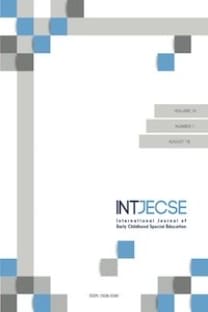Belçika'da (Fransızca Konuşan Toplum) Erken Çocukluk Müdahalesi: Aile ihtiyaçları, standartlar ve zorluklar
Early Childhood Intervention in Belgium (French Speaking Community): Family needs, standards and challenges
Early intervention, policy, practice Belgium, children, work with parents.,
___
Agence wallonne pour l’intégration des personnes handicapées (AWIPH). Available on the www.awiph.be website (retrieved 26.7.2010).Arrêté du Gouvernement wallon relatif aux conditions d’agrément et de subventionnement des services d’aide précoce et des services d’accompagnement pour adultes destinés aux personnes handicapées (M.B. du 10/06/2004, p.43851).
Flies, A. (2010). Intervention à domicile par un service d’aide précoce: le point de vue des parents. Unpublished document. University of Liège.
Portail de la Communauté française. Attendre un enfant. Handicap et aide précoce. Available on the http://www.cfwb.be/index.php?id=559 website (retrieved 26.7.2010)
Detraux, JJ., Szliwowski, H. (1997). Services for children with disabilities in European countries. Dev.Med &Child Neurology, 76 (39), 35-38.
Detraux, JJ. (2002). De la résilience à la bientraitance de l’enfant handicapé et de sa famille: essai d’articulation de divers concepts. Pratiques Psychologiques, 2002-1, 29-40.
Detraux, JJ., Di Duca, M. (2006). Handicap et bientraitance. In Thiel, M.J (Ed.), Entre malheur et espoir. Annoncer la maladie, le handicap, la mort. Strasbourg: Presses Universitaires de Strasbourg, 112-122.
Detraux, JJ, Di Duca, M. (2006). L’adaptation des familles face à une situation de handicap: co-construction par les parents et les professionnels d’un espacetemps de bientraitance. In Schneider, B. et al. (Eds.) Enfant en développement, famille et handicaps. Interactions et transmissions. Ramonville Saint Agne: Erès. 215-229.
www.eurlyaid.net retrievewd 3.8.2010
- ISSN: 1308-5581
- Başlangıç: 2009
- Yayıncı: İbrahim H. DİKEN
Türkiye'de Erken Çocukluk Müdahalesi: Güncel durum, zorluklar ve öneriler
Melek Er-sabuncuoglu And İbrahim H. DİKEN, İbrahim H. DİKEN
Erken Çocukluk Müdahalesinde Profesyonel Bir Kaynak Olarak PRECIOUS: Online araçlar ve standartlar
Avusturya'da Erken Çocukluk Müdahalesi
Climent GİNé, Anna Balcells And Joana MAS, Joana MAS
İngiltere'de Erken Çocukluk Müdahalesi: Aile, ihtiyaçlar, standartlar ve değişimler
Chris Robertson And Wendy MESSENGER, Chris ROBERTSON, Wendy MESSENGER
Litvanya'da Erken Çocukluk Müdahalesi: Organizasyon ve Değişimler
Almanya'da Erken Yardım Sistemi
Armin SOHNS, Annette Hartung And Olaf Kraus De CAMARGO, Annette HARTUNG
J.-j. Detraux And A.-f. THİRİON, J.-J. Detraux, A.-F. Thirion
İspanya'da erken çocukluk müdahalesi: Standart ihtiyaçlar ve değişimler
